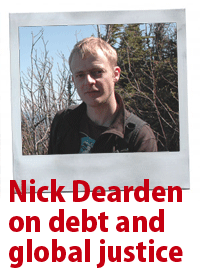The International Monetary Fund devastated the developing world – and now it’s targeting eastern Europe.
It’s stripped millions of people of their livelihoods, but the global economic crisis has brought one institution back from the dead: the International Monetary Fund.
Two years ago, the IMF looked to be on its last legs. It had got to a stage where no-one wanted to borrow the Fund’s money anywhere. Many developing countries started accumulating reserves to avoid ever having to go to the IMF loan shark. Developed countries in trouble would go just about anywhere –
Then came the meltdown. Despite the fact that the IMF failed to see it coming – pretty damning for a body supposed to oversee global financial stability – bankrupt countries suddenly had no choice but to come begging.
In April last year, the G20 pumped the organisation with £330 billion worth of new funds. The radical Uruguayan writer Eduardo Galeano called the decision “black humour”, saying it would “rub salt in the wound" of countries hit by a crisis they did not create.
The IMF claims to have been reborn. It says it has mended its ways (without apologising for them) and will do things differently this time around.
Certainly there are discussions about changing its voting system, which currently assigns
But in depression-hit eastern Europe the IMF is rapidly becoming as hated as it once was in
In the 1980s at the height of the Third World Debt crisis, the IMF lent huge amounts of money to developing countries, allowing them to pay off their loans to banks who had recklessly lent in the 1970s. The banks got bailed out, while the poor paid the price. Exactly the same thing is now happening in
The fund has led a rescue package of 7.5 billion euros (£6.7 billion) – but the price is eye-watering austerity measures. Schools and hospitals are expected to close and the government has pledged to reduce maternity benefits and raise taxes. Wages have been slashed by up to 40 per cent.
In
In
Late last year,
Clearly the IMF is as much about power as economics. This is nowhere seen more clearly than in
The IMF is repeating history. But so too are the people, with street protests in Riga, the Latvian capital, becoming increasingly militant and a small-scale renewal of anti-IMF activism in the west. It looks like the seeds of the next wave of resistance are already in place.
This article first appeared in Red Pepper.
Thanks to the Bretton Woods Project for some of the information it contains.

